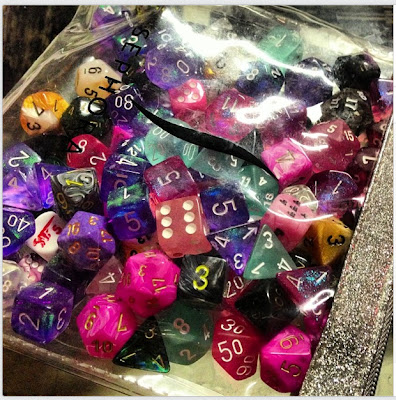Entries marked with a * are variations/extensions of the entries above them.
1, Foes rely on each other for completion of a multipart plan--if all foes die/are stymied, it's even worse for the PCs than if the foes' plan went off perfectly, so the PCs must carefully decide which to bump off.
3, Essential key to essential area isn't there, it's somewhere else in the adventure
4, *Roaming monster has it
5, *Key has pieces/multiple keys required
6, Map trick allows for prediction of secret door
7, *Realistic floorplan has obvious missing area
8, *Floorplan alternates in pattern (door on left, door on right, door on left…) missing part has secret door
9, *Floorplan's eccentric but symmetrical
10, *Floorplan's obviously shaped like some familiar object: star, hand, etc.
11, *-Shape is sacred to inhabitant/architect culture
12, *-Shape is worked into decoration of rooms
13, *-Shape is present by omission (nobody in the dungeon has a hand, shaped like left hand, etc)
14, Monster is only way to kill another monster
15, Monster is literal key to inorganic puzzle/door
16, Object is secretly key to defeating monster
17, Trap, once sprung, has key to important bit elsewhere in adventure. Success requires springing it
18, Verbal clue (found note)--puzzle clue hangs on secondary meaning of word
19, Haystack puzzle--there are tons of monsters, one has the thing
20, *Narrowing haystack--each defeated monster offers one clue to next monster
21, *-Narrowing ticking clock haystack--the longer it takes the more difficult the final showdown becomes
22, Monster only reappears worse when it dies unless some vital thing is done besides just hit it
23, Something that doesn't appear to be a map is one
24, Nonhuman intelligence (goblin, demon, etc) is expressing itself. What it thinks is very clear (verbally or leaving a note), but it only makes sense if you know/remember about their culture/mentality. For example: when an ogre says "food" it might mean something else…
25, *Ancient "emoticon"--turning message sideways or upside down makes sense of it. Show players a picture.
26, Picture clues: there's a specific and detailed picture you show the players, with clues in it. Noticing them reveals stuff.
27, An apparently random agglomeration of words uttered by some NPC (dying? insane?) is an address
28, Some monsters can get through a door, some can't. The players may notice all the ones on one side or able to traverse it have some distinguishing feature/mark--mutilated ear, etc. Doing that allows you through.
29, A given color is always an illusory surface with something through it/portal to another world
30, *"Key" color shifts round color wheel, so the first is red, then the second is orange, then yellow, etc
31, *"Key" is mixed with color of user's eyes (include mirror)
32, Lock/door responds to quantifiable element of character (age, eye color)--the closer to the desired value, the more the door/lock/gate etc responds (one door opens, two doors, three) because of some flaw in the manufacture
33, Monster is actually part of a monster. Make it a whole by combining monsters. It must be whole before it can be killed.
34, *Once it's whole it's no longer evil
35, The weapon you use against the monster changes the nature of the monster.
36, Deducing the creature's mission allows you to predict its actions. Predicting its actions is the only way to avoid or kill it.
37, A thing changes states: from trap to monster to treasure to clue etc. Observing the pattern allows you to stop the cycle at a desired moment.
38, *All monsters of a given species do this as they die--the trick is to kill them at the right moment
39, Creatures or mechanisms identify creatures by behavior not appearance. Can be fooled.
40, Creatures or mechanisms mirror party behavior.
41, Intercepted communication in simple code.
42, Simple vulnerability/key (earth, air, fire, water, blood, etc)
43, Magnetic trap not immediately obvious as magnetic trap, especially to victims in armor.
44, Babelfish/Apollo 13 trap: problem, apparent obvious solution, each obvious solution creates a new problem, until the chain finishes. Things needed to solve the problem are scattered throughout the location.
45, Killing monsters or taking treasure creates a problem--some subtle area denial weapon like gas or oil or disease or undead is released. This isn't noticeable immediately but the more you adventure the harder you make it on yourself.
46, The large door mechanism's broke: you have to do some precarious thing while someone else in the party does some other precarious thing in order to open it. Of course while you're doing that the monsters come.
47, You need to kill the boss monster but leave some vital part intact, so certain attacks are off the table.
48, Drowning or other slow area-denial trap made by accidentally flipping a switch in a big machine-room--fixing it requires realizing some unobtrusive object is a missing part.
49, Villain's backstory requires keeping a prisoner nearby. Prisoner is disguised as pet, member of court, concubine, statue etc.
50, PC failure in a certain zone/room disproportionately strengthens the enemy, so the choice of battlefield is important. (Like: dying on level 1 adds a head to the hydra)
51, Fight in minefield-like situation/Falling Rocks/Thin Ice
52, *Rickety floor but enemies can fly
53, *Certain "landmines" don't kill but instead make environment weirder
54, *Chalk circles contain spells that activate
55, *Chalk circles imprison demons, breaking chalk releases them
56, PCs' predicament requires capturing a fierce foe alive or else they die.
57, Attacks on monster activate automatic counterattack
58, Hunting foe can hide/move through a specific kind of object--can come from underneath a rug, through any open window, etc.
59, Presence of common thing strengthens foe--light, sound, reflective surfaces, hair, etc
60, Physical space mapped to chronological space--i.e. going up or north goes forward in time, going down or south goes back in time, etc
61, Time, lighting, gravity, shape of things, weather, etc mapped to disposition of innocuous object
62, Voracious foe secretly requires specific surprising food source
63, Behavior of foe mapped to "voodoo doll"-like object
64, Friend and foe's situation mapped to each other--hurt one, you hurt the other, etc
65, Two foes' situations mapped to each other. Foes aren't in the same place.
66, Controlling villain is disguised as background creature/object
67, Environment is fragile/destructible (made of spider webs, etc)
68, Foe/place has dominion over common weapon element--fire, steel, etc--that weapon, if used, will turn on user
69, Ghost or whatever has outstanding issue that needs to be handled in order for it to be put to rest
70, *Golem/iron cobra/necrophidius has a "program" which it keeps running requiring it to head to a room whose door's been bricked over
71, All actions in (sealed?) room A cause resulting actions by monsters in room B.
72, Capabilities displayed by PCs in (sealed?) room/complex A allow creature in area B to do all those things: if you ever cast fireball there, it can too now etc
73, Colors map to supernatural property of area, work into subtle room descriptions--rooms with blue in them=magic doesn't work, rooms with yellow mean metal doesn't work, etc.
74, Pac_Man-esque situation--harmless creature becomes voracious and dangerous (and physically different) when exposed to specific object/area of dungeon
75, Object/location is Dorian-Grey-style storage area for something noncorporeal or esoteric (bitterness, fat, sleep, etc) opening or destroying or interacting with it lets it all out
76, Enemy can snipe at you from a protected position. Preventing it requires finding a hidden entrance to the network that leads to where they are while being sniped at.
77, New magic item has a general, not-obviously-useful purpose (change the color of any object for instance) which is, not obviously, the key to a situation (yellow goblins at war with red goblins for instance)
78, Boss has a "boss pattern".
79, *Army has a "boss pattern"
80, *Every creature in an area acts in a coordinated "boss pattern"
81, *"Boss pattern" code is encoded in an object like a musical score--changing it changes the behavor of the boss or foes
82, Death trap-like murder devices in rooms have a pattern (reverse gravity room first, magnetic room second, etc) that can be altered by altering the object the pattern is written into. Change the "score" change the order of the rooms. (Disperse party to make this important?)
83, Rival group is in the same dungeon/sandbox/wilderness/castle. PCs made to magically monitor their progress and position from afar but neither side knows the area well.
84, Combat in cramped, physically discontinuous space like: going out the west door brings you in through the ceiling, etc. No direction is what it seems but it's stable.
85, Dungeon/monster effects strictly keyed to a specific NPC's reactions to events--happy=ceiling lowers, angry=monster appears, etc.
86, Monsters don't want PCs dead, the room/an inanimate object present does. Attacks don't stop until it's addressed.
87, "Learning foe" starts stupid, develops Sentinel-like response to any tactic after 1 attack.
88, A trap situation is set up--the trap _will_ activate under x y z conditions (ritual summons a devouring creature for instance). Foe attempts to get PCs to fulfill the conditions w/out revealing themself.
89, Apparently irrational behavior of creature is part of complex ritual, interrupting the behavior or altering it causes the ritual to go awry in analogous way. For example: the path the foe takes through the city is the one their terrible Star God, once summoned, will take through the city.
90, Previous events erased/reversed by a magic device. Like: each of 10 candles maps to a previous combat round--extinguish the candle, undo the round, etc.
91, Time pressure: x complex task must be completed before y disastrous consequence. Approach of y is clear and on a graduated scale. T-minus 10, 9, 8
92, *Evidence of approaching consequence is not obvious at first.
93, PCs are in a situation where most actions have major consequences and they are instantly made aware (prescience, crystal ball) of consequences after taking the action. You killed that guy? Here's the duke discussing the cavalry goblins he's left to his widow, etc.
94, PCs are in a situation where any viable action will have immediate major obvious consequences. Like: any one of several NPC generals in the room has to die but each one of them is in control of a different army that will invade the dungeon if that leader does not leave alive. So the decision is which army or armies to unleash and defend themselves against.
95, *Each kind of monster has a known deleterious or warping effect on the local environment--deciding the order to kill the monsters in decides the shape of the environment for confronting the next. Like: if you kill the white dragon first, the dungeon will freeze over, if you kill the blue one first, all metal in the dungeon will rust, etc.
96, Foe has-/is composed of- a number of debilitating problems (blind, crippled, stupid, etc). Defeating the foe requires these be off-loaded onto someone else (probably PCs). Probably the best way is to give different problems to different PCs.
97, *Debilitating aspects are self-canceling if organized properly, so like if you take the foe's cowardice and recklessness they cancel each other out, so the trick is to be organized.
98, NPCs and monsters secretly react to PCs based on some obscure-but-discoverable detail of clothing/hair etc
99, Dungeon/building doesn't naturally lead to goal/exit. The space must be rearranged using some mechanism inside the space.
100, *Rearranging the mechanism can make further rearrangings of the mechanism more difficult
-
-
-






























































